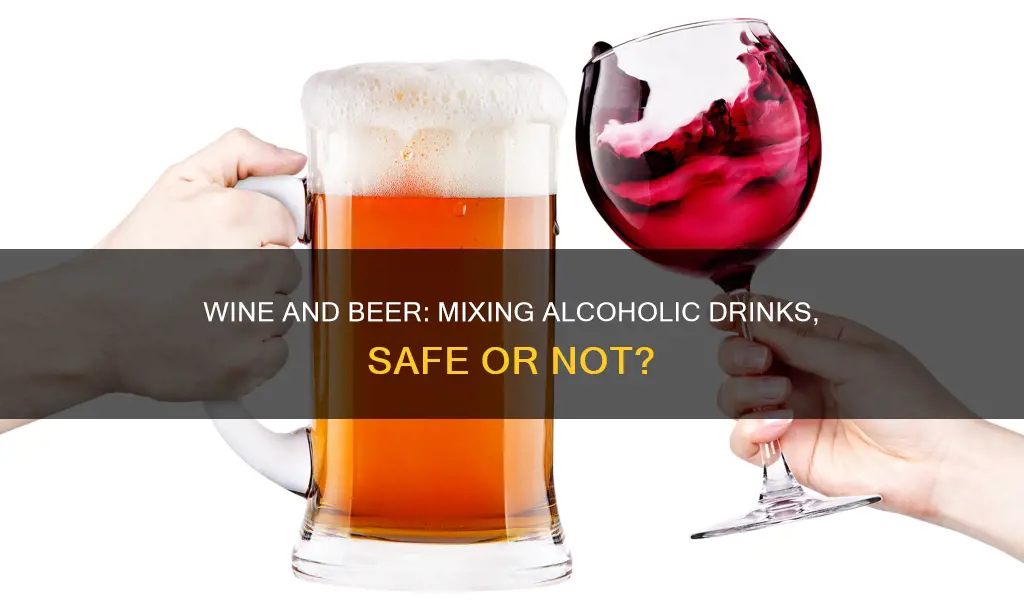
There are many theories about whether drinking wine before beer will make you sick. One popular saying goes, Beer before wine and you'll feel fine; wine before beer and you'll feel queer. However, scientists have debunked this, proving that the order of drinks does not affect the severity of a hangover. A study conducted by researchers from Witten/Herdecke University in Germany and the University of Cambridge in the UK found that participants who drank beer before wine and vice versa reported similar hangover intensities. So, whether you drink wine before beer or vice versa, the key to avoiding a hangover is moderation.
| Characteristics | Values |
|---|---|
| Total amount of alcohol consumed | Has a much bigger effect on how you feel than the specific order of drinks |
| Carbonation in beer | May make you absorb alcohol more quickly, leading to greater inebriation and a worse hangover |
| ABV | Beer usually has a lower ABV than wine or spirits-based drinks |
| Volume | Beer is usually larger in volume than wine or spirits-based drinks |
| Effect of drinking order | There is little scientific evidence to suggest that drinking types of alcohol in a specific order can decrease your chances of getting a hangover or make it more bearable |
What You'll Learn

Beer before wine, you'll be fine
There is a popular saying that goes, "beer before wine and you'll feel fine; wine before beer and you'll feel queer." This implies that drinking beer before wine will help you avoid a bad hangover. But is there any truth to this?
Well, it turns out that this is just a myth. A study conducted by researchers at Witten/Herdecke University in Germany and the University of Cambridge in the UK set out to scientifically evaluate whether the order of drinking beer and wine has any impact on hangover severity. The study involved 90 volunteers between the ages of 19 and 40, who were split into three groups with different drinking orders: beer followed by wine, wine followed by beer, or only beer or only wine. The groups were similar in terms of gender, body size, drinking habits, and hangover frequency.
The results of the study showed that the order of drinking beer and wine did not have a significant impact on hangover symptoms. In other words, it doesn't matter if you drink beer before wine or vice versa—if you drink too much, you're still likely to experience a hangover. The best predictors of a bad hangover are how drunk you feel and whether you vomit after drinking.
So, while the saying "beer before wine, you'll be fine" may sound catchy, it's not necessarily true. The total amount of alcohol consumed and individual factors such as genetics, hydration, and food consumption are more important determinants of how you'll feel the next day. As the saying goes, "moderation is key"!
Remember, drinking responsibly and knowing your limits are crucial to avoid unpleasant hangovers and ensure your safety.
Explore Anna Maria Island's Beer-Friendly Culture
You may want to see also

Wine before beer, you'll feel queer
"Wine before beer and you'll feel queer" is a well-known phrase, but is there any truth to it? Well, according to a study by the University of Cambridge, it's nothing but a myth.
The study, which was published in the American Journal of Clinical Nutrition, set out to determine whether there was any truth to the saying. 90 volunteers between the ages of 19 and 40 were split into three groups. The first group drank beer followed by wine, the second group drank wine followed by beer, and the third group drank only beer or only wine. The groups were then switched a week later so that the order of drinks was reversed.
The participants were monitored and asked about their wellbeing and level of drunkenness throughout the experiment. The following day, they were given a hangover score based on factors such as thirst, fatigue, headache, dizziness, and nausea. Interestingly, the researchers found no significant difference in hangover severity between the three groups. The only reliable predictors of a bad hangover were how drunk the participants felt and whether they vomited.
So, while the saying "wine before beer and you'll feel queer" has been passed down through the generations, it doesn't hold much weight in reality. It's not the order of drinks that matters, but rather the total amount of alcohol consumed. As the old saying goes, "everything in moderation"!
Of course, it's always important to drink responsibly and to know your limits. Excessive alcohol consumption can not only lead to unpleasant hangovers but can also have more serious consequences for your health and well-being.
The Beer Bug Mystery: How Does It Work?
You may want to see also

Grape or grain, but never the twain
"Grape or grain, but never the twain" is a phrase that warns against drinking wine and beer together. It is one of many similar sayings in different languages that suggest the order in which you consume alcoholic drinks can affect how you feel the next day. For example, the German saying "Wein auf Bier, das rat' ich Dir—Bier auf Wein, das lass' sein" and the French "Bière sur vin est venin, vin sur bière est belle manière" both suggest that drinking wine after beer is unwise.
The idea that drinking wine after beer will make you feel unwell is not supported by scientific evidence. A 2019 study by researchers at Witten/Herdecke University in Germany and the University of Cambridge in the UK found no evidence that drinking beer before or after wine had any impact on hangover severity. Ninety volunteers between the ages of 19 and 40 were split into three groups and given either beer, wine, or both drinks in different orders. The researchers found that none of the three groups had significantly different hangover scores, regardless of the order in which they consumed the alcoholic drinks.
Another study by Cambridge University in 2019 also found that volunteers who were given two and a half pints of beer followed by four large glasses of wine reported just as bad a hangover as those who had the wine first and then the beer.
The total amount of alcohol consumed is a much bigger factor in how you will feel the next day than the specific order of drinks. As Dr. Kai Hensel, a senior clinical fellow at the University of Cambridge and senior author of the study, says, "The truth is that drinking too much of any alcoholic drink is likely to result in a hangover."
So, while the phrase "grape or grain, but never the twain" may be a catchy way to remember to avoid mixing drinks, it is not based on scientific evidence. The most important factor in predicting how you will feel the next day is how drunk you feel and whether you vomit, not the order in which you consume your drinks.
Parking Lot Beer: Is It Legal to Drink?
You may want to see also

Carbonation affects alcohol absorption
However, recent studies have found no correlation between hangover symptoms and the order in which drinks are consumed. A 2019 study at Cambridge University found that participants who drank beer followed by wine reported similar hangover intensity as those who drank wine first and then beer. While the total amount of alcohol consumed has a much larger effect on how one feels, carbonation can still influence alcohol absorption.
Alcohol is primarily absorbed into the bloodstream through the lining of the small intestine, which has a large surface area for absorption and an extensive blood supply. A small amount of alcohol is also absorbed in the stomach, but at a slower pace. Carbonation affects this process by creating pressure in the stomach, accelerating gastric emptying, and allowing alcohol to move into the small intestine more quickly. This pressure may cause the pyloric sphincter, a muscular valve at the bottom of the stomach, to open prematurely, leading to faster alcohol absorption.
Studies have provided mixed results regarding the impact of carbonation on alcohol absorption. A 2003 study with six participants found that those who drank carbonated champagne had higher blood alcohol content (BAC) in the first 20 minutes compared to those who drank degassed champagne. However, after 40 minutes, both groups had similar BAC levels. Another study in 2006 with 21 participants tested vodka served neat, mixed with still water, and mixed with sparkling water. This study found that 14 out of 21 subjects absorbed alcohol faster when mixed with carbonated water, while the remaining seven showed no change or a decrease in absorption rate.
In conclusion, while carbonation may influence the rate of alcohol absorption, the effect is not consistent across individuals and may be influenced by various factors such as gender, mood, food intake, and drinking speed. The belief that carbonated drinks lead to faster intoxication is not universally supported by scientific research, and other factors, such as the total amount of alcohol consumed, play a more significant role in determining hangover severity.
Marijuana and Beer: Mixing Effects and What You Should Know
You may want to see also

Alcohol is absorbed well and quickly, regardless of the source
Alcohol is absorbed into the body quickly, no matter the type of drink. This is an important fact to remember when considering the age-old adage, "beer before wine and you'll feel fine; wine before beer and you'll feel queer". This saying suggests that the order in which you consume alcoholic drinks matters and can influence how you feel the next day. However, scientific studies have debunked this myth, finding that the total amount of alcohol consumed has a much bigger impact on hangover severity than the specific order of drinks.
The belief that drinking beer before wine leads to milder hangovers may be based on a few theories. One idea is that if you start with wine and then switch to beer, the carbonation in the beer causes you to absorb the alcohol from the wine more quickly and easily, leading to increased intoxication and a worse hangover. Another theory relates to alcohol by volume (ABV); since beers are usually larger in volume but have a lower ABV than wine or spirits, it takes longer to drink a beer, theoretically giving the body more time to process the alcohol.
Despite these theories, research has shown that the order of drinks does not significantly affect hangover intensity. A 2019 study at Cambridge University found that participants who drank beer followed by wine reported similar hangover symptoms to those who drank wine first and then beer. The study involved 90 volunteers between the ages of 19 and 40, who were split into three groups with different drinking orders. The researchers concluded that drinking too much of any alcoholic beverage is likely to result in a hangover, regardless of the order of drinks.
So, while it's important to remember that alcohol is absorbed quickly and can lead to unpleasant hangovers, the specific type and order of drinks may not be as crucial as previously thought. Responsible drinking and knowing your limits are more effective ways to prevent hangovers and ensure a better day after a night out.
RV Drinking Laws: Beer and Driving
You may want to see also
Frequently asked questions
No, that's just a myth. A study conducted by researchers at Witten/Herdecke University in Germany and the University of Cambridge in the UK found that the order of drinks does not affect the severity of a hangover.
No, the saying is not true. The study mentioned above debunked this myth and found that the order of drinks does not matter when it comes to hangovers.
There are a few theories as to why this saying originated. One theory is that people tend to start their evenings with drinks that have a lower alcohol content, such as beer or wine, and move on to stronger drinks as the night progresses. So, if they end up getting sick, they may blame it on the order of drinks. Another theory suggests that starting with liquor and ending with beer may slow subsequent spikes in blood alcohol levels, potentially reducing the severity of a hangover.
The amount of alcohol consumed, whether you ate before drinking, how frequently you drink, genetics, congeners (natural compounds in alcohol that can contribute to hangovers), and smoking are all factors that can affect the severity of a hangover.
The only reliable way to prevent a hangover is to not drink alcohol. However, to reduce the risk of a hangover, it is recommended to not drink on an empty stomach, limit your alcohol intake, and avoid smoking.







